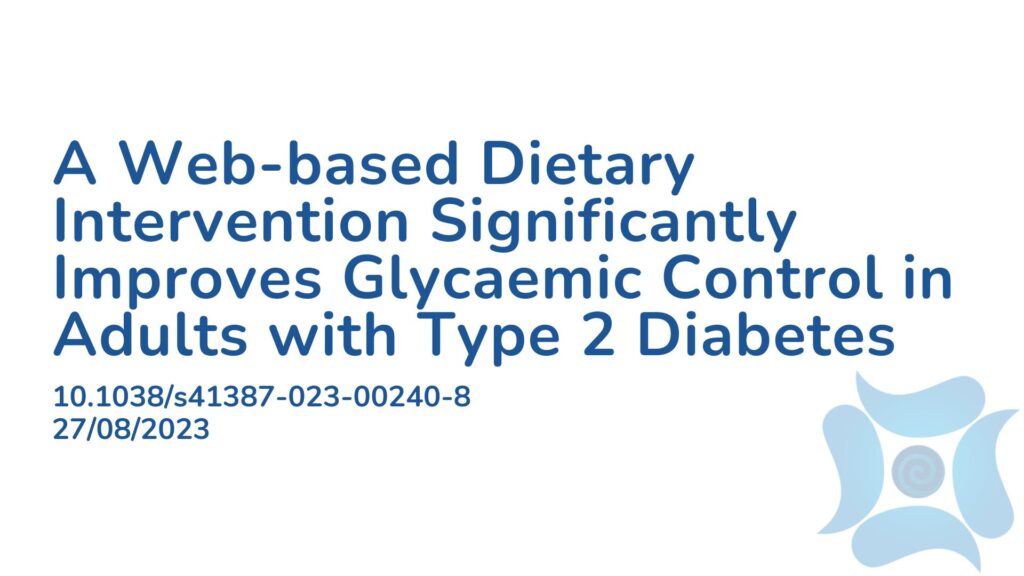Summary:
For individuals living with type 2 diabetes mellitus (T2DM), modifying their diet is crucial, as it has been proven to support overall health and glucose level targets. While there isn’t a specific recommended diet, it’s widely acknowledged that carbohydrates have the most significant impact on glycemic control and there is substantial evidence to support this. Both ketogenic and low carbohydrate diets have demonstrated improved glycemic control, weight loss, and reduced medication requirements. There is an urgent need to extend access to dietary education in order to self-manage T2DM, as many populations such as those in remote and rural areas do not have access to the advice or guidance needed to self-manage this condition with diet. Therefore, other options are needed such as web delivered dietary education and intervention. This study looked at the impact of standard care combined with a web-based low carbohydrate education program versus standard care alone, amd measured glycemic control in adults with T2DM. Secondary objectives of the study included evaluating any reduction in T2DM medication, body weight, body-mass index and overall dietary intake between the two groups. Ninety-eight participants were enrolled and split into two groups. At 16 weeks there was a significant difference between the two groups in favor of the low carbohydrate web-education group, showing notable reductions in blood glucose levels, weight, and medication use. This study concludes that a web-based T2DM diet program is an effective adjunct treatment method to standard care with positive clinical outcomes among adults with T2DM.
Abstract:
Background/objectives: In people with type 2 diabetes mellitus (T2DM), low carbohydrate diets (LCD), defined as 10–<26% total energy intake from carbohydrate, have indicated improved glycaemic control and clinical outcomes. Web-based interventions can help overcome significant challenges of accessibility and availability of dietary education and support for T2DM. No previous study had evaluated a web-based LCD intervention using a randomised controlled trial (RCT) design. The objective of this study was to assess whether a web-based LCD programme provided in conjunction with standard care improves glycaemic control in adults with T2DM. Subjects/methods: A 16-week parallel RCT was conducted remotely during Covid-19 among the general community, recruiting adults with T2DM not on insulin aged 40–89 years. Participants were randomly assigned (1:1) to standard care plus the web-based T2Diet healthy LCD education programme (intervention) or standard care only (control). The primary outcome was haemoglobin A1c (HbA1c). Secondary outcomes were weight, body mass index (BMI), anti-glycaemic medication, dietary intake, and self-efficacy. Blinded data analysis was conducted by intention-to-treat. Results: Ninety-eight participants were enrolled, assigning 49 to each group, with 87 participants (n = 40 intervention; n = 47 control) included in outcome analysis. At 16 weeks, there was a statistically significant between-group difference favouring the intervention group, with reductions in HbA1c –0.65% (95% CI: –0.99 to –0.30; p < 0.0001), weight –3.26 kg (p < 0.0001), BMI –1.11 kg/m2 (p < 0.0001), and anti-glycaemic medication requirements –0.40 (p < 0.0001), with large effect sizes Cohen’s d > 0.8. Conclusion: This study demonstrated that as an adjunct to standard care, the web-based T2Diet programme significantly improved glycaemic control and clinical outcomes in adults with T2DM. In addition, the results highlight the potential to improve access and availability for people with T2DM to achieve glycaemic control and improved health through web-based dietary education and support.
Article Publication Date: 27/08/2023
DOI: 10.1038/s41387-023-00240-8



